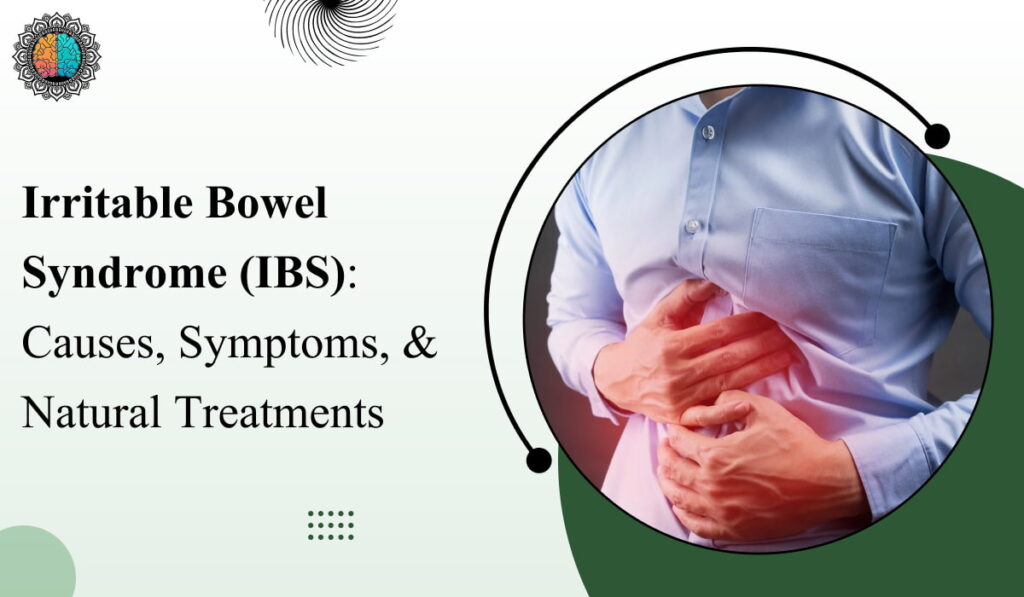
That nagging bloating, the unpredictable bathroom trips, the awkward stomach noises when you’re just trying to enjoy a meal—sound familiar? You’re not alone. These could be signs of Irritable Bowel Syndrome (IBS), a condition that quietly affects millions, yet often goes undiagnosed or misunderstood.
In fact, according to the International Foundation for Gastrointestinal Disorders (IFFGD), it’s estimated that 5-10% of the population has IBS. However, only 20 to 40% of them are aware of their condition and make efforts to treat it. Countless people are silently battling symptoms that disrupt their daily lives, not realizing there’s a name—and relief—for what they’re experiencing.
But what exactly is IBS? What causes it? How to manage IBS, along with the pain and unpredictability that comes with it, without relying entirely on medications? Can something like gut-directed hypnotherapy for IBS make a difference?
This blog unpacks everything you need to know – whether you’re newly diagnosed or simply searching for answers, you’re in the right place.
Irritable Bowel Syndrome (IBS) is a common digestive health condition that affects the large intestine. People with IBS often experience vary in intensity and frequency, including abdominal pain or cramping, bloating, excess gas, and noticeable changes in bowel habits—such as diarrhea, constipation, or alternating between both.
While IBS doesn’t damage the digestive tract or lead to more serious diseases, it can significantly affect a person’s day-to-day comfort and quality of life.
The exact IBS cause isn’t fully understood, but it’s believed to involve a combination of factors, including abnormal gut-brain communication, heightened sensitivity of the intestines, gut microbiome imbalance, food intolerances, stress, and past infections or trauma.
It is quite common. As per the American College of Gastroenterology, between 10% to 15% of adults in the United States suffer from Irritable Bowel syndrome.
Other Possible IBS Symptoms:
Read More: Is Hypnotherapy the Answer to Better Sleep?
Some of the common IBS causes are as follows:
Some of the effective yet natural IBS treatments are as follows:
Watch Your Diet: Avoid common trigger foods like dairy, gluten, fried or spicy foods, and opt for a low FODMAP diet if recommended. Eating smaller, well-balanced meals can help reduce bloating and cramping.
Stay Hydrated: Drinking plenty of water throughout the day supports healthy digestion, prevents constipation, and helps flush out toxins from the body.
Get Moving: Regular physical activity, even something as simple as walking or yoga, can help regulate bowel movements, reduce bloating and carmping, and ease stress.
Use Medications Wisely: Depending on your IBS symptoms, your doctor might suggest fiber supplements, anti-diarrheal medications, antispasmodics, or low-dose antidepressants to relieve pain and improve gut function.
Practice Mind-Body Therapies
– Techniques like mindfulness, meditation, and cognitive behavioral therapy (CBT) can help lower stress and anxiety, both of which play a major role in IBS flare-ups.
Try Hypnotherapy: Gut-directed hypnotherapy has shown strong results in calming the digestive health system by targeting the gut-brain connection. Hypnotherapy for stress and anxiety can reduce pain, normalize bowel movements, and improve the overall quality of life.
Read More: Benefits of Hypnosis for Anxiety: How it Helps?
Irritable Bowel Syndrome can feel overwhelming, especially when symptoms are unpredictable or hard to manage with diet alone. But you’re not alone—and there are many ways to support your body and regain control.
From adjusting your IBS-friendly diet plan to understanding how stress and gut health are deeply connected, every small change makes a difference.
And if you’re seeking support beyond conventional care, you can explore Hypnotherapy Sessions with ManahSculpt. I’m Jigeesha Pandya, a Certified hypnotherapist in California, and I specialize in helping people feel better—mentally, emotionally, and physically with personalized sessions.
How Is IBS Diagnosed by a Hypnotist in California?
Hypnotists do not diagnose IBS. Instead, they work in collaboration with medical doctors who are qualified to provide a formal diagnosis. With a medical referral and guidance from the medical professional, a hypnotherapist can successfully help clients manage IBS symptoms through gut-directed hypnotherapy. This approach supports the brain-gut connection, enhances digestion, and addresses related issues such as stress and anxiety—helping those with a medical diagnosis experience real relief.
How to Relieve IBS Pain Naturally?
Some natural remedies to relieve IBS symptoms are as follows:
Jigeesha Pandya is a Certified Hypnotherapist and Reiki Practitioner. With a background in climate change research, she shifted her focus to hypnotherapy, studying at the renowned Hypnosis and Motivation Institute in Los Angeles. Jigeesha is passionate about helping individuals harness the power of the subconscious mind for healing and growth.
